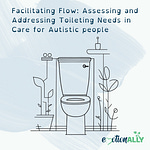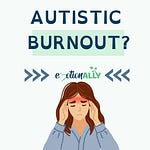Although rejection sensitivity dysphoria is more commonly associated with ADHD (estimates range from 50-99% of ADHDers (or people with ADHD depending on your preferred nomenclature) experience some level of RSD) it is also a common, but not universal experience for Autistic folk. Despite these observations, there is a need for more empirical research to definitively establish the mechanisms, prevalence, and potential coping strategies for RSD.
Rejection sensitive dysphoria (RSD) is a not a clinical diagnosis (although there are continued efforts to formally recognise RSD in diagnostic frameworks) but an experience of extreme emotional sensitivity and pain due to perceived or actual rejection, criticism, or failure. The term "dysphoria" refers to a profound state of unease or dissatisfaction. It is worth noting that the experience of RSD can happen to anyone, neurodivergent or not. Characteristics of RSD include intense emotional responses to rejection or criticism, whether real or perceived episodes of severe depression or feelings of worthlessness when facing rejection. This in turn increases the potential for social withdrawal or avoidance of situations where exposure to criticism or rejection is possible and can drive a tendency toward perfectionism, or people pleasing driven by the fear of making mistakes and being judged.
While RSD is commonly recognized the neurodivergent community and experts by experience, its formal classification within diagnostic manuals like the DSM-5 is still under debate. The concept is supported by anecdotal clinical observations and reports from a multitude of individuals rather than large-scale, peer-reviewed studies.
The experience of extreme emotional (and even physical) pain and anxiety can happen even when objectively there is no rejection or criticism. This can trigger a fight or flight response and lead to actions we might regret later.
I think about in terms of an oversensitive nervous system. If you imagine a nervous system is a video doorbell, the motion sensor activates whether it is triggered by a burglar trying to break into your house or just a fox scavenging the bins. Either way your internal systems are registering a threat to your safety.
Humans are social animals. We expect to be part of a team or a tribe. Ultimately, we rely on collaboration with others to survive. Thinking about these feelings as a result of an extremely sensitive nervous system (due to a combination of what is likely to be genetic and brain chemistry issues) can make them more manageable. Neurodivergent folk may have heightened sensitivity to social cues and expectations due to differences in how their brains process information. This can make them particularly vulnerable to perceived rejection, even in subtle social interactions.
RSD can come with intense feelings of shame. It may be helpful to ask yourself is this 100% true? Am I 100% sure that I am being rejected? And if so is this going to matter to me when I'm on my deathbed? Be kind to yourself and breathe through the distress, taking deep diaphragmatic breaths with long exhales to activate the calming parasympathetic nervous system (if this is something you can tolerate) or engage in something that brings you joy. It may also help to use a combination of progressive muscle relaxation, mindfulness, and grounding techniques.
Ask yourself are these thoughts helpful? Remember to breathe, they are just thoughts, and the feeling of RSD is temporary. Be kind to yourself and remember no matter what your nervous system might be telling you, you are enough.














Share this post